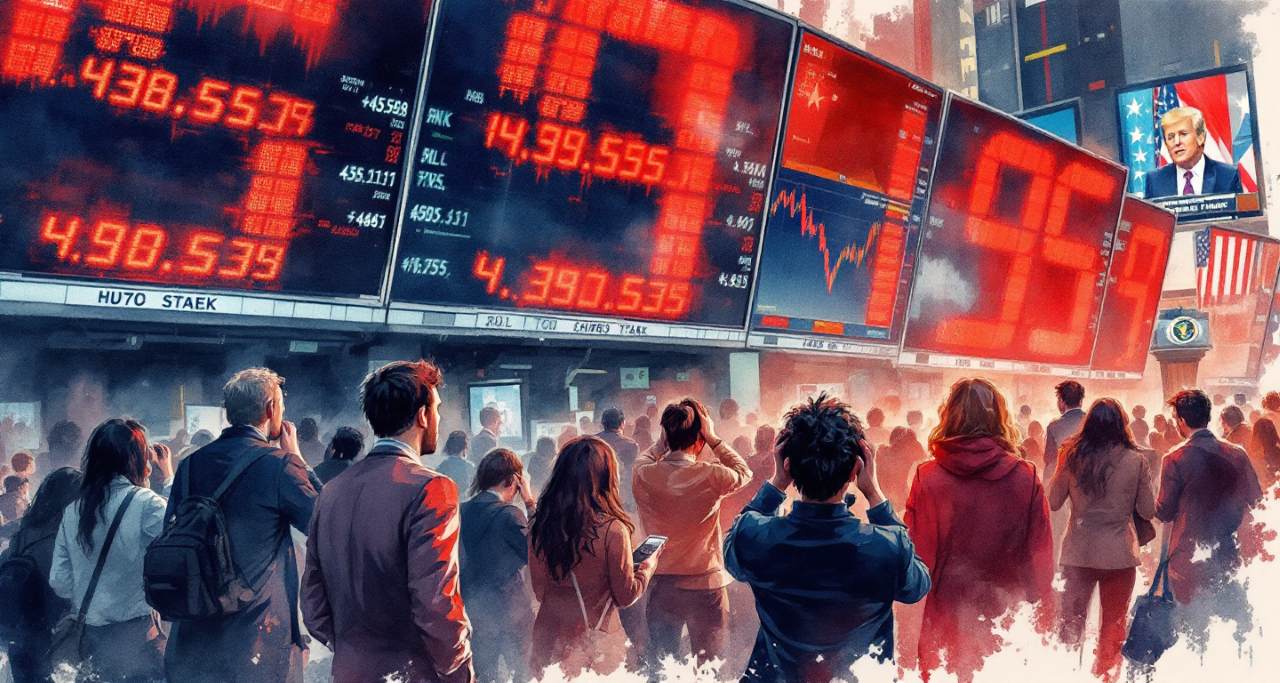
In a dramatic reversal that sent shockwaves through global financial markets, the Dow Jones Industrial Average plummeted nearly 2,000 points Thursday after the White House clarified that tariffs on Chinese imports would actually total a staggering 145%, significantly higher than previously understood.
The clarification came just one day after a historic market rally sparked by President Trump’s surprise announcement of a 90-day pause on most tariffs. That brief euphoria evaporated when administration officials explained that the 125% tariff on Chinese goods announced Wednesday was actually in addition to a 20% tariff imposed earlier this year over fentanyl concerns.
“What we’re witnessing is economic whiplash of historic proportions,” said Morgan Stanley chief economist Elena Ramirez. “The markets initially celebrated what appeared to be a de-escalation, only to discover the trade war with China is actually intensifying beyond what anyone anticipated.”
The selloff wiped out most of Wednesday’s gains, with the S&P 500 dropping 5% and the tech-heavy Nasdaq plunging 6%. The two-day market volatility has erased over $6 trillion in market value, representing one of the most turbulent periods on Wall Street since the COVID-19 pandemic.
Tariff Confusion Creates Market Chaos
The White House’s clarification created immediate confusion among investors, businesses, and consumers. National Economic Council director Kevin Hassett attempted to calm markets by announcing that the U.S. has received “serious” trade deal offers from nearly 20 nations, with two deals “almost closed.”
However, Hassett also confirmed that the 10% baseline tariff would likely remain in place for most countries, even with negotiated agreements. “It is going to take some kind of extraordinary deal for the president to go below 10%,” Hassett told CNBC.
Meanwhile, China has retaliated with an 84% tariff on U.S. goods, escalating tensions between the world’s two largest economies. Despite the growing conflict, President Trump expressed optimism about eventual negotiations with Beijing, telling reporters, “They want to make a deal, they just don’t know quite how to go about it. It’s one of those things. They’re proud people.”
Economic Impact Spreading
Economists warn that American consumers should brace for significant price increases on everything from clothing to electronics, regardless of the 90-day pause on some tariffs.
“The tariff mix is actually worse,” said Bloomberg LP’s chief economist Anna Wong. “China exports more consumer goods to the U.S. than other countries, so boosting that relative to others will increase the hit to consumption goods.”
The agricultural sector is particularly concerned about prolonged trade tensions with China. Agriculture Secretary Brooke Rollins acknowledged Thursday that the administration is considering aid packages for American farmers and egg producers to mitigate tariff damage.
Federal Reserve Chair Jerome Powell expressed concern that the tariffs could stoke persistent inflation. “While tariffs are highly likely to generate at least a temporary rise in inflation, it is also possible that the effects could be more persistent,” Powell said at an event in Arlington, Virginia. “Uncertainty is high. What we’ve learned is that the tariffs are higher than anticipated, higher than almost all forecasters predicted.”
What Comes Next?
As markets continue to process the implications of these tariffs, investors are increasingly pricing in more aggressive interest rate cuts from the Federal Reserve to counter potential economic damage. Money market futures now anticipate cumulative rate cuts of 100 basis points by year-end, up from about 75 basis points a week earlier.
The European Union has responded to Trump’s 90-day pause by temporarily suspending its own planned retaliatory measures. “We took note of the announcement by President Trump,” European Commission President Ursula von der Leyen said. “We want to give negotiations a chance.”
For American consumers and businesses, however, the outlook remains deeply uncertain. As President Trump acknowledged during a Cabinet meeting Thursday: “There’ll be a transition cost and transition problems, but in the end, it’s going to be a beautiful thing.”
Whether markets and the broader economy share that optimism remains to be seen.
